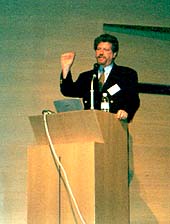WWVi International Symposium: Communication and Broadcasting in the Age of Internet 2001
Session 1: Television in the Broadband Age
Keynote speaker:
Eli M. NOAM (Professor, Columbia University)
Panelists:
Kazuhiko NISHI (Visiting Professor, MIT), Masaharu TAKANO (President, Bitmedia Inc.), Kazu MATSUI (Music Producer), Keiko MATSUI (Pianist)
Coordinator:
Nobuo IKEDA (Professor, GLOCOM)
RealVideo: Keynote Speech by Eli M. NOAM New
A video (approx. 9 min.) from WWVi International Symposium on February 26, 2001 is available here.
 Note: To view RealVideo, you need to have RealPlayer G2 or later installed in your computer. You can download the free RealPlayer here. Note: To view RealVideo, you need to have RealPlayer G2 or later installed in your computer. You can download the free RealPlayer here.
Presentation Summary :
Keynote Speech: Eli M. NOAM (Professor, Columbia University)
"Next-Generation TV in the US: Short Term Problems, Long Term Strengths"
 I am truly happy to be here in Japan and to talk about some of the issues that are of central importance for the next media environment which combines the Internet, that enormously dynamic medium, with television, that enormously influential medium that has been now around for more than fifty years. I am truly happy to be here in Japan and to talk about some of the issues that are of central importance for the next media environment which combines the Internet, that enormously dynamic medium, with television, that enormously influential medium that has been now around for more than fifty years.
In the past we had two kinds of networks. One was fat, but limited. Broadcast networks and cable TV networks were high-capacity broadband but also shared, like a party line, because they are expensive. And the second kind of networks were skinny and individualized, not shared, and the telephone network was the most classic example. It had a limited capacity, but today we are in the stage in which capacity prices and transmission prices are coming down both in terms of the amount of bits, but also in terms of distance and sensitivity. So all kinds of things are possible and we are in the midst of a very important historic stage, a very important move from the kilobit stage to the megabit stage of individualized communications, and in fact shortly to the gigabit stage.
Now in the short term, I have to report to you that many, if not all, aspects of digitalization in the States have encountered problems from the moderate to the serious. The problems that have been encountered are in HDTV or DTV, enhanced or interactive TV, digital video recorders, digital cable and digital STB, and also in broadband connectivity, 3G wideband wireless, the push Internet, Internet TV itself, and content programming, with the exception of two positive notes: Satellite Digital TV and DVDs.
Although the U.S. faces various problems in the short term, there will be U.S. dominance in content and applications in the long term. Economics here are by my calculation that there are major economies of scale, that is, good content production is expensive but to distribute that content is very cheap. Therefore there are some real advantages for companies that are early entrants with big budgets, diversifying the risk that can be distributed over their platforms and additional platforms and can be tied in with other products, and possibly have already created user communities along the lines of AOL. Globalization is advanced because international transmission is becoming cheap and the Internet is becoming available increasingly around the world and, therefore, creates potential user base.
So in that environment I think that it is particularly American companies that are likely to be successful for various reasons. One is that the Internet is particularly advanced in the U.S. There is a critical domestic mass. There are strong software, hardware and content industries, and access to risk capital. Entertainment production is traditionally strong in the U.S. The English language is an advantage. There are advantages of a strong tradition of mail order businesses and the existence of credit cards. And there is a talent pool that keeps being replenished by people migrating to the U.S. So in that sense, Internet TV is likely to combine the strengths of the U.S. in entertainment, Internet and electronic transactions. If you add to this economies of scale, the U.S. is likely to be quite strong in this field.
My reading of strength in that future digital TV environment is one that in the hardware sector, whether it is DVDs, PBRs, Digital TV, 3G wireless, or STBs, Japanese strength in consumer electronics is likely to prevail here too with Japan becoming a strong supplier. But when it comes to content, the U.S. is going to be even stronger than it is today in the TV field. Plus, it is likely to be strong in the delivery field where it is today, not an international player because these markets are so domestic. So whether it is DVS, interactive TV or Internet TV, the U.S. will set the model that will be exported directly to other countries or through partnerships in those countries.
I see Japan and the U.S as the two legs of the future digital TV environment. I see a much weaker role for European companies, with possible exceptions of Phillips and some other European companies. Even in those companies, a significant part of their contents strength is being derived from American ownership. In terms of leadership positions, the U.S. and Japan are two legs, and that is why I am so happy to be here in Japan and to have the opportunity to talk to you, because I would like to understand what the Japanese leg will look like. The most creative stage of TV is just starting and together we can make it even more exciting. Thank you very much for your attention.
|





